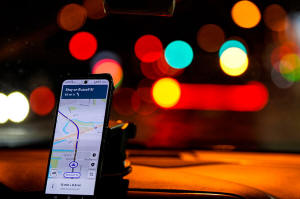Newsom signs bill giving 800,000 Uber and Lyft drivers in California the
right to unionize
[October 04, 2025] By
TRÂN NGUYỄN
SACRAMENTO, Calif. (AP) — More than 800,000 drivers for ride-hailing
companies in California will soon be able to join a union and bargain
collectively for better wages and benefits under a measure signed Friday
by Gov. Gavin Newsom.
Supporters said the new law will open a path for the largest expansion
of private sector collective bargaining rights in the state's history.
The legislation is a significant compromise in the yearslong battle
between labor unions and tech companies.
California is the second state where Uber and Lyft drivers can unionize
as independent contractors. Massachusetts voters passed a ballot
referendum in November allowing unionization, while drivers in Illinois
and Minnesota are pushing for similar rights.
Newsom announced the signing at an unrelated news conference at
University of California, Berkeley. The new law will give drivers
“dignity and a say about their future,” he said.
The new law is part of an agreement made in September between Newsom,
state lawmakers and the Service Employees International Union, along
with rideshare companies Uber and Lyft. In exchange, Newsom also signed
a measure supported by Uber and Lyft to significantly cut the companies'
insurance requirements for accidents caused by underinsured drivers.

Lyft CEO David Risher said in September that the new insurance rates are
expected to save the company $200 million and could help reduce fares.
Uber and Lyft fares in California are consistently higher than in other
parts of the U.S. because of insurance requirements, the companies say.
Uber has said that nearly one-third of every ride fare in the state goes
toward paying for state-mandated insurance.
Labor unions and tech companies have fought for years over drivers'
rights. In July of last year, the California Supreme Court ruled that
app-based ride-hailing and delivery services like Uber and Lyft can
continue treating their drivers as independent contractors not entitled
to benefits like overtime pay, paid sick leave and unemployment
insurance. A 2019 law mandated that Uber and Lyft provide drivers with
benefits, but voters reversed it at the ballot in 2020.
The collective bargaining measure now allows rideshare workers in
California to join a union while still being classified as independent
contractors and requires gig companies to bargain in good faith. The new
law doesn’t apply to drivers for delivery apps like DoorDash.
[to top of second column] |

A Lyft driver takes a customer to the airport, Jan. 29, 2024,
in Baltimore. (AP Photo/Mike Stewart, File)
 The insurance measure will reduce
the coverage requirement for accidents caused by uninsured or
underinsured drivers from $1 million to $60,000 per individual and
$300,000 per accident.
The two measures "together represent a compromise that lowers costs
for riders while creating stronger voices for drivers —demonstrating
how industry, labor, and lawmakers can work together to deliver real
solutions,” Ramona Prieto, head of public policy for California at
Uber, said in a statement.
Rideshare Drivers United, a Los Angeles-based advocacy group of
20,000 drivers, said the collective bargaining law isn’t strong
enough to give workers a fair contract. The group wanted to require
the companies to report its data on pay to the state.
New York City drivers' pay increased after the city started
requiring the companies to report how much an average driver earns,
the group said.
“Drivers really need the backing of the state to ensure that not
only is a wage proposal actually going to help drivers, but that
there is progress in drivers' pay over the years,” said Nicole
Moore, president of Rideshare Drivers United.
Other drivers said the legislation will provide more job safety and
benefits.
Many who support unionization said they have faced a slew of issues,
including being “deactivated” from their apps without an explanation
or fair appeals process when a passenger complains.
“Drivers have had no way to fight back against the gig companies
taking more and more of the passenger fare, or to challenge unfair
deactivations that cost us our livelihoods,” Ana Barragan, a gig
driver from Los Angeles, said in a statement. “We’ve worked long
hours, faced disrespect, and had no voice, just silence on the other
end of the app. But now, with the right to organize a strong,
democratic union, I feel hope.”
All contents © copyright 2025 Associated Press. All rights reserved
 |